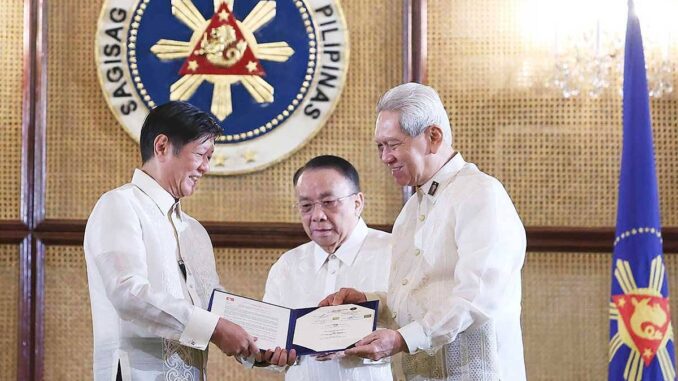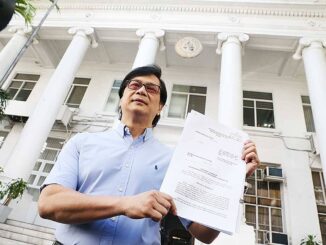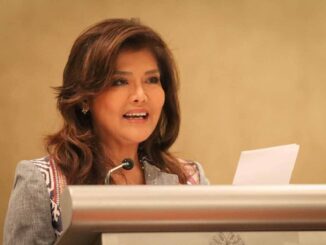
PRESIDENT Ferdinand Marcos Jr. on Tuesday said that the war against corruption is “far from over” due to gaps in implementation, evolving political climates, and systemic vulnerabilities in the bureaucracy.
Marcos issued the statement as he reiterated the Philippines’ position to collaborate with the United Nations in fighting corruption.
Speaking during the 5th State Conference on the United Nations Convention against Corruption (Uncac) Implementation and Review in Malacañang, Marcos stressed the country would remain as a “proactive member of the global community” in fighting corruption.
ANTI-CORRUPTION MANIFESTO President Ferdinand Marcos Jr. receives the 5th State Conference manifesto from Ombudsman Samuel Martires and Executive Secretary Lucas Bersamin during the 5th State Conference of the United Nations Convention against Corruption Implementation and Review in Malacañang on Dec. 3, 2024. PPA POOL
“By learning from and working with other nations, we strengthen our anti-corruption mechanisms while reaffirming our place as a proactive member of the global community,” he added.
In 2014, Marcos said that the government institutionalized the Integrity Management Program (IMP), providing a clear anti-corruption framework. It served as a tool to enhance both individual and systems integrity across the bureaucracy.
“However, a decade into its execution, several challenges persist and prove to be unexpectedly complex,” the president said.
“Gaps in implementation, evolving political climates, and systemic vulnerabilities remind us that the war against corruption is far from over,” he added.
Marcos said the Philippine government must encourage the practice of core values that help promote integrity.
“We must shift away from merely enforcing compliance with laws, rules and regulations, to steering our people towards the practice of integrity in their daily lives,” the president said.
Marcos said the government employs a “two-pronged approach” in the fight against corruption — digitalization and people participation.
He said streamlining and digitalizing government processes would minimize the avenues of corruption as government transactions became more transparent and accessible to the public.
The initiative was being undertaken through the New Government Procurement Act, which establishes standardized electronic bidding and payment systems through the enhanced Philippine Government Electronic Procurement System, the president said.

President Ferdinand Marcos Jr. receives the 5th State Conference manifesto from Ombudsman Samuel Martires and Executive Secretary Lucas Bersamin during the 5th State Conference of the United Nations Convention against Corruption (UNCAC) Implementation and Review in Malacañang on Tuesday, December 3, 2024. The Philippines is one of the State Parties to the UNCAC that complies with its treaty obligations to develop and maintain policies that promote society participation and reflect the principles of the rule of law, proper management of public affairs and public property, integrity, transparency and accountability. PPA POOL / MARIANNE BERMUDEZ

President Ferdinand Marcos Jr. receives the 5th State Conference manifesto from Ombudsman Samuel Martires and Executive Secretary Lucas Bersamin during the 5th State Conference of the United Nations Convention against Corruption (UNCAC) Implementation and Review in Malacañang on Tuesday, December 3, 2024. The Philippines is one of the State Parties to the UNCAC that complies with its treaty obligations to develop and maintain policies that promote society participation and reflect the principles of the rule of law, proper management of public affairs and public property, integrity, transparency and accountability. PPA POOL / MARIANNE BERMUDEZ

President Ferdinand Marcos Jr. receives the 5th State Conference manifesto from Ombudsman Samuel Martires and Executive Secretary Lucas Bersamin during the 5th State Conference of the United Nations Convention against Corruption (UNCAC) Implementation and Review in Malacañang on Tuesday, December 3, 2024. The Philippines is one of the State Parties to the UNCAC that complies with its treaty obligations to develop and maintain policies that promote society participation and reflect the principles of the rule of law, proper management of public affairs and public property, integrity, transparency and accountability. PPA POOL / MARIANNE BERMUDEZ

President Ferdinand Marcos Jr. receives the 5th State Conference manifesto from Ombudsman Samuel Martires and Executive Secretary Lucas Bersamin during the 5th State Conference of the United Nations Convention against Corruption (UNCAC) Implementation and Review in Malacañang on Tuesday, December 3, 2024. The Philippines is one of the State Parties to the UNCAC that complies with its treaty obligations to develop and maintain policies that promote society participation and reflect the principles of the rule of law, proper management of public affairs and public property, integrity, transparency and accountability. PPA POOL / MARIANNE BERMUDEZ

President Ferdinand Marcos Jr. receives the 5th State Conference manifesto from Ombudsman Samuel Martires and Executive Secretary Lucas Bersamin during the 5th State Conference of the United Nations Convention against Corruption (UNCAC) Implementation and Review in Malacañang on Tuesday, December 3, 2024. The Philippines is one of the State Parties to the UNCAC that complies with its treaty obligations to develop and maintain policies that promote society participation and reflect the principles of the rule of law, proper management of public affairs and public property, integrity, transparency and accountability. PPA POOL / MARIANNE BERMUDEZ

President Ferdinand Marcos Jr. receives the 5th State Conference manifesto from Ombudsman Samuel Martires and Executive Secretary Lucas Bersamin during the 5th State Conference of the United Nations Convention against Corruption (UNCAC) Implementation and Review in Malacañang on Tuesday, December 3, 2024. The Philippines is one of the State Parties to the UNCAC that complies with its treaty obligations to develop and maintain policies that promote society participation and reflect the principles of the rule of law, proper management of public affairs and public property, integrity, transparency and accountability. PPA POOL / MARIANNE BERMUDEZ

President Ferdinand Marcos Jr. receives the 5th State Conference manifesto from Ombudsman Samuel Martires and Executive Secretary Lucas Bersamin during the 5th State Conference of the United Nations Convention against Corruption (UNCAC) Implementation and Review in Malacañang on Tuesday, December 3, 2024. The Philippines is one of the State Parties to the UNCAC that complies with its treaty obligations to develop and maintain policies that promote society participation and reflect the principles of the rule of law, proper management of public affairs and public property, integrity, transparency and accountability. PPA POOL / MARIANNE BERMUDEZ
“The integration of data analytics with the procurement process facilitates informed decision-making by procuring entities and the identification of suspicious, fraudulent, and non-competitive practices. This will in turn provide transparency and proactive government monitoring, thereby ensuring judicious government spending,” Marcos said.
“By streamlining and digitalizing processes, we are improving the efficiency and fostering trust and accountability between government and the public,” he added.
Marcos also emphasized empowering the people to participate in good governance through the electronic Freedom of Information platform.
“Through the electronic Freedom of Information platform, citizens now have avenues to exercise their right to vital government information. Our national budget, which is detailed to the project level, is published online, allowing our people to know how much and for what public funds are being spent on,” Marcos said.
“The New Government Procurement Act also includes measures that ensure the accessibility of procurement processes and contract implementation information; engage observers and Civil Society Organizations in procurement; and make all procurement-related conferences available for public viewing,” he added.
The Uncac is an international anti-corruption treaty ratified, accepted, approved and acceded to by 180 countries.
It aims to promote and strengthen State Parties’ measures to prevent and combat corruption more effectively and efficiently; to facilitate and support international cooperation and technical assistance in preventing and fighting corruption, including asset recovery; and to promote integrity, accountability and proper management of public affairs and properties.
The government signed the convention on Dec. 9, 2023, and was subsequently ratified by the Senate on Nov. 6, 2006.





Be the first to comment